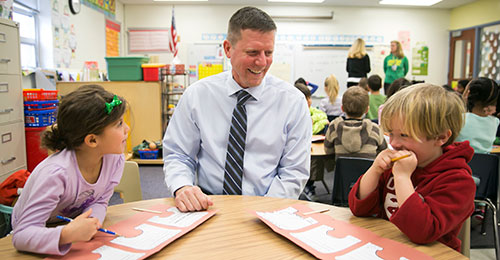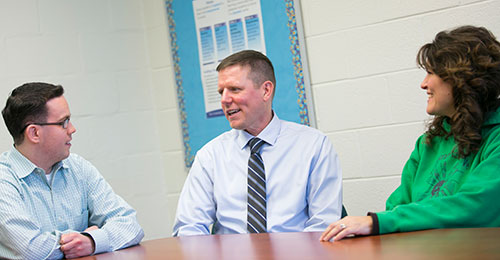J.T. Ridgely, School Psychologist, Atholton Elementary School; and Chairperson, HCPSS Crisis Intervention Teams
February 25th, 2016

Dr. J.T. Ridgely splits his time as a school psychologist for Atholton Elementary School and Atholton Elementary Regional Early Childhood Center, and as the chairperson of the HCPSS Crisis Intervention Teams. Ridgely enjoys both roles because as he said, “It’s a chance to make a difference with kids and adults who may need support or strategies to accomplish a goal or begin to cope with a difficult situation. With crisis management, it’s more immediate. You can often see positive outcomes that same day when you help someone begin to identify and access appropriate coping mechanisms.”
Ridgely has worked as a school psychologist for the HCPSS for the past 17 years. Howard County school psychologists promote educationally and psychologically healthy environments for all children and adolescents by implementing research-based, effective programs that prevent problems, enhance independence and promote optimal learning. The role can include providing consultations with staff and families, counseling, educational strategy interventions, proactive trainings and programming, assessments and staff professional development.

Ridgely especially enjoys working with the elementary age because he can help with early reading and writing skills. Ridgely said, “It’s a critical time to intervene with kids, so they’re not struggling their whole academic career.” He said, “We look at creating a good instructional match with the skills the students already have. We focus on that and build up from the positive rather than just looking at what they can’t do. When we do that, and everyone has the tools to help students be successful, we see kids take off.”
Ridgely has served in his other role, as the chairperson of the HCPSS Crisis Intervention Teams, for the last eight years and has been a member of the Crisis Intervention Teams for his entire HCPSS career. During his time on the crisis team, Ridgely has consulted on and/or responded to more than 500 school crises, and has helped develop and provide approximately 80 crisis trainings for HCPSS school-based and district-level crisis teams. He has also provided consultation and training for other area school systems and university graduate programs.
Ridgely greatly appreciates the dedication of his crisis team members, as he emphasized that crisis management “needs to be a team approach; no one person can do it.” Fifty counselors, pupil personnel workers, nurses and psychologists volunteer to serve on the district-level crisis team in addition to their other school-based responsibilities. This team has helped with responses at individual schools, after staff or student deaths and traumatic injuries; and for the entire school district following large-scale events, such as the Columbia Mall shooting and Sandy Hook.

By the time Ridgely graduated from college, he had spent enough time volunteering at the counseling center on campus and coaching soccer to know he wanted to work with kids. He decided to pursue school psychology, and while he was doing his school psychology internship in Howard County, his interest in crisis management was sparked when he joined the county crisis team. Once hired, he asked to stay on the team, and his participation evolved from crisis responder to team co-leader, prior to his current role. Ridgely earned his doctorate at the University of Maryland, College Park in 2006. His dissertation focused on developing, implementing and evaluating a crisis training curriculum for school-based professionals.
Coordinator of School Psychology, Section 504 and Instructional Intervention Dr. Cynthia Schulmeyer, who has known Ridgely since his graduate school days, described his approach to crisis intervention with, “His calmness, demeanor and thoroughness make people feel like they can handle these difficult situations. He’s the guiding hand. J.T.’s also very collaborative and works with anyone in the school system–he’s one of a kind.” She explained that through his leadership, “he’s created a culture that crisis intervention is something that’s very valuable and important.”

In both roles, Ridgely has demonstrated leadership through coaching and developing others’ skills. With HCPSS’ commitment to crisis preparation and response, he was part of the leadership group that helped launch annual trainings for school-based teams 15 years ago. Now schools often feel comfortable handling crises with just consultations from the county team. He explained that the school system follows best training practices because, “Research shows that schools can manage crises more effectively with good school-based crisis teams. The goal is to provide students and staff access to coping supports when needed and help the school community regain a sense of normalcy.” Appropriate, timely responses are also essential these days as rumors and information can spread quickly through social media.
His leadership as a school psychologist can be seen with his role as the facilitator of the Instructional Intervention Team at Atholton. There, Ridgely helped transition the handling of instructional interventions to a case management model and collaborates with a team of case managers, so a referred student can get matched to a specific case manager for individualized attention. Atholton Elementary School Principal Denise Lancaster praises “his expertise in supporting teachers in how to best differentiate for all of our many learners. When the social and emotional pieces are intact, when kids feel supported emotionally, they’re more available for learning.”
Lancaster, who has known Ridgely professionally for 15 years, calls him one of her “go-to” people for discussing school matters. She credits him with having “good judgment” and “expertise” in both of his roles, so the needs of all families, staff and students are met.
 HCPSS
HCPSS